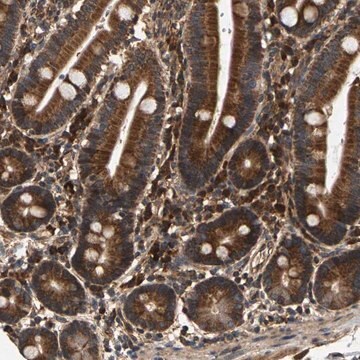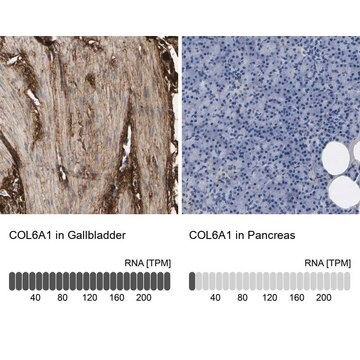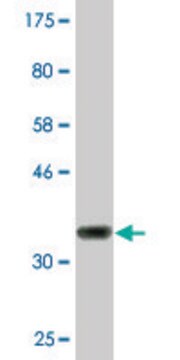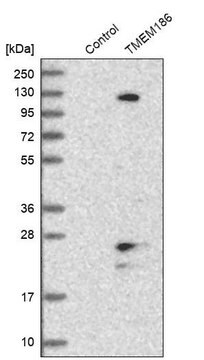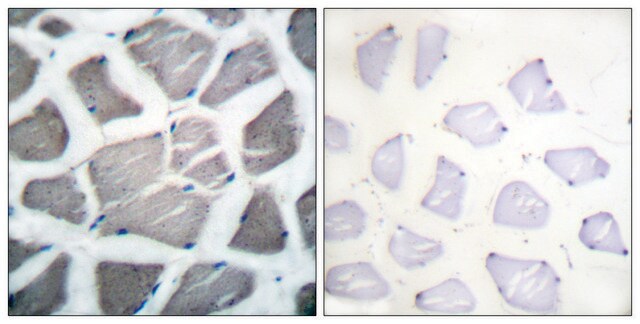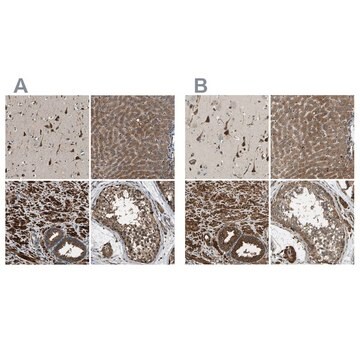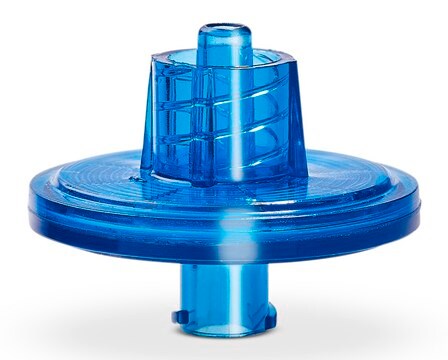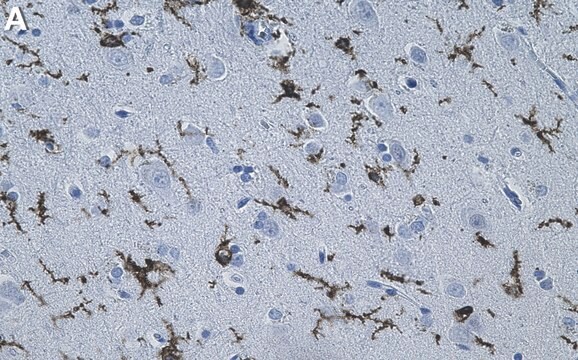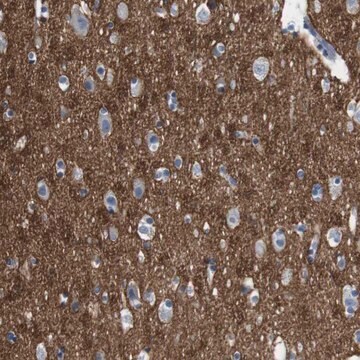HPA018837
Anti-CIDEC antibody produced in rabbit
Prestige Antibodies® Powered by Atlas Antibodies, affinity isolated antibody, buffered aqueous glycerol solution, Ab1
同義詞:
Anti-Cell death activator CIDE-3, Anti-Cell death-inducing DFFA-like effector protein C, Anti-Fat-specific protein FSP27 homolog
登入查看組織和合約定價
全部照片(2)
About This Item
推薦產品
生物源
rabbit
品質等級
共軛
unconjugated
抗體表格
affinity isolated antibody
抗體產品種類
primary antibodies
無性繁殖
polyclonal
產品線
Prestige Antibodies® Powered by Atlas Antibodies
形狀
buffered aqueous glycerol solution
物種活性
human
技術
immunohistochemistry: 1:20- 1:50
免疫原序列
MEYAMKSLSLLYPKSLSRHVSVRTSVVTQQLLSEPSPKAPRARPCRVSTADRSVRKGIMAYSLEDLLLK
UniProt登錄號
運輸包裝
wet ice
儲存溫度
−20°C
目標翻譯後修改
unmodified
基因資訊
human ... CIDEC(63924)
一般說明
The gene CIDEC (cell death-inducing DFFA-like effector protein C) is mapped to human chromosome 3p25. It belongs to cell-death-inducing DNA-fragmentation-factor (DFF45)-like effector family. CIDEC is mainly present in small intestine, heart, colon and stomach. The protein localizes to the cytoplasm in punctuate manner. CIDEC is popularly called as CIDE-3.
免疫原
Cell death activator CIDE-3 recombinant protein epitope signature tag (PrEST)
應用
All Prestige Antibodies Powered by Atlas Antibodies are developed and validated by the Human Protein Atlas (HPA) project and as a result, are supported by the most extensive characterization in the industry.
The Human Protein Atlas project can be subdivided into three efforts: Human Tissue Atlas, Cancer Atlas, and Human Cell Atlas. The antibodies that have been generated in support of the Tissue and Cancer Atlas projects have been tested by immunohistochemistry against hundreds of normal and disease tissues and through the recent efforts of the Human Cell Atlas project, many have been characterized by immunofluorescence to map the human proteome not only at the tissue level but now at the subcellular level. These images and the collection of this vast data set can be viewed on the Human Protein Atlas (HPA) site by clicking on the Image Gallery link. We also provide Prestige Antibodies® protocols and other useful information.
The Human Protein Atlas project can be subdivided into three efforts: Human Tissue Atlas, Cancer Atlas, and Human Cell Atlas. The antibodies that have been generated in support of the Tissue and Cancer Atlas projects have been tested by immunohistochemistry against hundreds of normal and disease tissues and through the recent efforts of the Human Cell Atlas project, many have been characterized by immunofluorescence to map the human proteome not only at the tissue level but now at the subcellular level. These images and the collection of this vast data set can be viewed on the Human Protein Atlas (HPA) site by clicking on the Image Gallery link. We also provide Prestige Antibodies® protocols and other useful information.
生化/生理作用
Cell death-inducing DFFA-like effector protein C (CIDEC) induces apoptosis via condensation of nuclei and DNA-fragmentation. In addition, it causes lipid accumulation in cells. The protein has been shown as a lipid droplet-binding protein. Nonsense mutation in CIDEC is associated with partial lipodystrophy and insulin resistant diabetes. CIDEC is down-regulated in hepatocellular carcinoma. Presence of CIDEC induces apoptosis in cells.
特點和優勢
Prestige Antibodies® are highly characterized and extensively validated antibodies with the added benefit of all available characterization data for each target being accessible via the Human Protein Atlas portal linked just below the product name at the top of this page. The uniqueness and low cross-reactivity of the Prestige Antibodies® to other proteins are due to a thorough selection of antigen regions, affinity purification, and stringent selection. Prestige antigen controls are available for every corresponding Prestige Antibody and can be found in the linkage section.
Every Prestige Antibody is tested in the following ways:
Every Prestige Antibody is tested in the following ways:
- IHC tissue array of 44 normal human tissues and 20 of the most common cancer type tissues.
- Protein array of 364 human recombinant protein fragments.
聯結
Corresponding Antigen APREST74258
外觀
Solution in phosphate-buffered saline, pH 7.2, containing 40% glycerol and 0.02% sodium azide
法律資訊
Prestige Antibodies is a registered trademark of Merck KGaA, Darmstadt, Germany
未找到適合的產品?
試用我們的產品選擇工具.
儲存類別代碼
10 - Combustible liquids
水污染物質分類(WGK)
WGK 1
閃點(°F)
Not applicable
閃點(°C)
Not applicable
Tan Hooi Min Grahn et al.
Biochemical and biophysical research communications, 432(2), 296-301 (2013-02-13)
Human adipocytes express high levels of two distinct lipid droplet proteins, fat specific protein 27 (FSP27; also called CIDEC), a member of the CIDE family, and perilipin1 (PLIN1), a member of the PAT family. Both proteins play a role in
Liang Liang et al.
The Biochemical journal, 370(Pt 1), 195-203 (2002-11-14)
DNA fragmentation is one of the critical steps in apoptosis, which is induced by DNA fragmentation factor (DFF). DFF is composed of two subunits, a 40 kDa caspase-activated nuclease (DFF40) and a 45 kDa inhibitor (DFF45). Recently a novel family
Pernille Keller et al.
The Journal of biological chemistry, 283(21), 14355-14365 (2008-03-13)
FSP27 (fat-specific protein 27) is a member of the cell death-inducing DNA fragmentation factor-alpha-like effector (CIDE) family. Although Cidea and Cideb were initially characterized as activators of apoptosis, recent studies have demonstrated important metabolic roles for these proteins. In this
Jie Min et al.
Medical oncology (Northwood, London, England), 28 Suppl 1, S219-S227 (2010-10-20)
Cell death-inducing DFF45-like effector-3 (CIDE-3) is a novel member of an apoptosis-inducing protein family, but its function is unknown. CIDE-3 shows a different distribution pattern in hepatocellular carcinoma (HCC) tissues and normal adjacent tissues. Therefore, this work tested the hypothesis
Oscar Rubio-Cabezas et al.
EMBO molecular medicine, 1(5), 280-287 (2010-01-06)
Lipodystrophic syndromes are characterized by adipose tissue deficiency. Although rare, they are of considerable interest as they, like obesity, typically lead to ectopic lipid accumulation, dyslipidaemia and insulin resistant diabetes. In this paper we describe a female patient with partial
我們的科學家團隊在所有研究領域都有豐富的經驗,包括生命科學、材料科學、化學合成、色譜、分析等.
聯絡技術服務